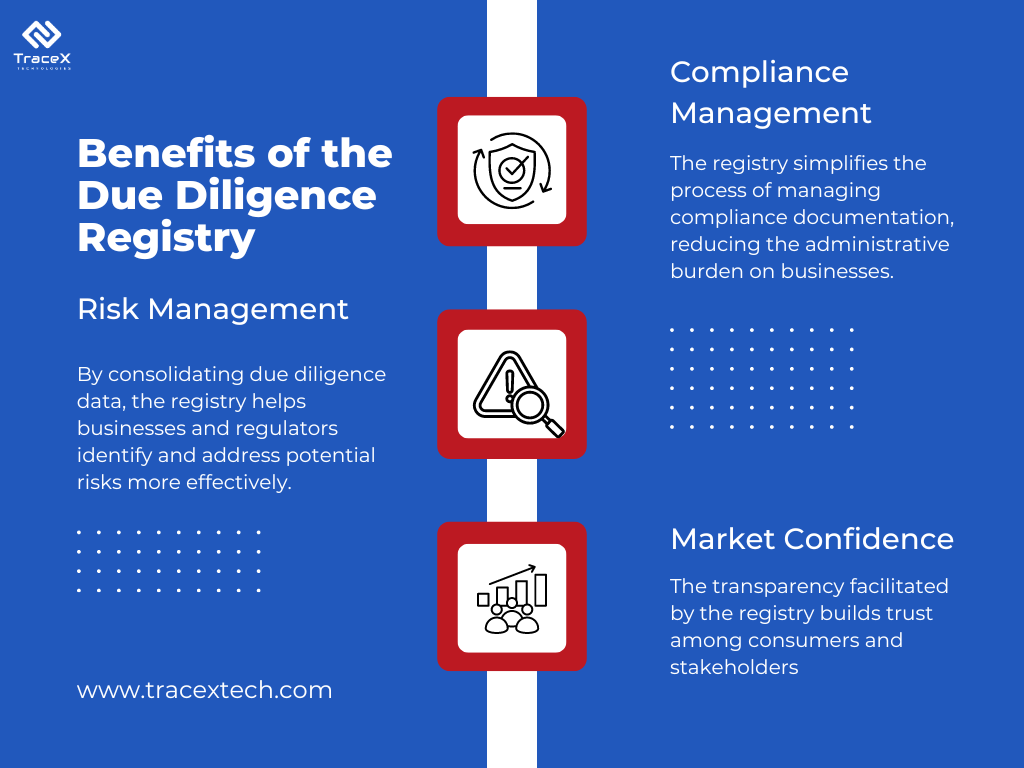Contact: +91 99725 24322 |
Menu
Menu
Quick summary: At the core of EU Deforestation regulation are the Due Diligence Registry and Information System, which serve as critical tools for ensuring transparency and accountability. We delve into how the Due Diligence Registry helps businesses provide evidence of their supply chains' sustainability, while the Information System supports the collection, management, and dissemination of crucial data. Learn about the challenges businesses face and discover how leveraging advanced technology solutions can streamline compliance processes.

The European Union’s commitment to environmental sustainability and combating deforestation has led to the development of the EU Deforestation Regulation (EUDR). With the introduction of the Due Diligence Registry and Information System, companies are now required to meticulously track and report the origins of their products to prevent deforestation and promote sustainable practices. The pain point? Many businesses struggle with integrating these new regulatory requirements into their existing processes, often facing challenges in gathering accurate data and maintaining transparency.
This regulatory shift is not just a compliance hurdle but a chance to elevate your sustainability efforts. By understanding and leveraging the EUDR’s new system, you can transform compliance challenges into a strategic advantage, ensuring your operations are not only legally sound but also aligned with global sustainability goals.
The EUDR, officially adopted by the European Parliament and published in the EU Official Journal, represents a significant stride toward ensuring that the EU market does not support products linked to deforestation. The regulation mandates that products entering the EU market, including commodities like cocoa, coffee, soy, palm oil, and wood, must be proven to be deforestation-free. This requires companies to provide detailed documentation and evidence of the provenance of their products.
The Due Diligence Registry is a comprehensive database designed to collect, store, and manage the due diligence information required under the EUDR. This registry is a central element in the regulatory framework, facilitating transparency and accountability in the supply chains of products imported into the EU.
The registry serves as a repository for all due diligence documentation, including geolocation data, risk assessments, and compliance reports. It ensures that businesses can upload and access critical information required for proving that their products are not linked to deforestation.
By centralizing due diligence data, the registry supports verification processes and helps regulatory authorities monitor compliance. This centralized approach streamlines the review process and enhances the accuracy of compliance checks.
The registry contributes to greater transparency and traceability within the supply chain. It allows stakeholders, including regulatory bodies and consumers, to trace the origins of products and verify their deforestation-free status.

The EU Information System is a digital infrastructure that supports the operation of the Due Diligence Registry. It encompasses the technical and procedural elements required for data submission, management, and access within the registry. The system ensures that the registry functions smoothly and efficiently.
The integration of the Due Diligence Registry and the Information System is crucial for the effective implementation of the EUDR. This integration ensures that data flows seamlessly between the two components, supporting efficient compliance management and verification processes
The integration ensures that data submitted to the registry is consistent and accurate. It enables the Information System to process and validate information effectively, maintaining the integrity of the due diligence data.
The combined functionality of the registry and the Information System supports real-time monitoring and reporting. Regulatory authorities can access up-to-date information on compliance, enabling prompt actions and decision-making.
The integration fosters collaboration between businesses, regulators, and other stakeholders. It creates a centralized platform for sharing information and coordinating efforts to ensure that products entering the EU market meet the required sustainability standards.
According to Article 13 of EU:
By 30 December 2024, the Commission shall establish and subsequently shall maintain an information system which shall contain the due diligence statements made available pursuant to Article 4(2).
The Commission shall, by means of implementing acts, establish rules for the functioning of the information system under this Article, including rules for the protection of personal data and exchange of data with other IT systems. Those implementing acts shall be adopted in accordance with the examination procedure referred to in Article 36(2).
The Commission shall provide access to that information system to customs authorities, competent authorities, operators and traders and, if applicable, their authorised representatives, in accordance with their respective obligations under this Regulation.
Ensuring that all data entered into the registry is accurate, complete, and up to date can be challenging. Inaccurate data can lead to compliance issues and potential penalties.
Many companies already use various systems for managing their supply chain data. Integrating these existing systems with the new due diligence registry can be complex and resource intensive.
Collecting data from all suppliers and verifying its authenticity can be time-consuming and challenging. Companies need to ensure that they gather accurate information about the origin of raw materials and products.
Implementing and maintaining compliance with the EUDR can involve significant costs, including investments in technology, training, and additional personnel.
The EUDR introduces new requirements and standards that may be complex to understand and apply. Keeping up with evolving regulations and ensuring adherence can be difficult, especially for smaller businesses with limited resources.
Achieving full transparency in the supply chain, especially when dealing with complex global networks, can be challenging. Companies must trace products back to their origins and ensure that all links in the supply chain meet regulatory standards.
Handling large volumes of sensitive data raises concerns about privacy and data security. Ensuring that data is protected from breaches and misuse while complying with data protection regulations is critical.
For businesses operating across multiple jurisdictions, aligning with the EUDR while navigating different national regulations can be particularly challenging.
Coordinating with various stakeholders, including suppliers, regulatory bodies, and internal teams, requires effective communication and collaboration, which can be challenging to manage.
Addressing these challenges involves investing in robust systems, continuous training, and effective processes to ensure compliance and enhance sustainability efforts.
The TraceX EUDR Compliance Platform stands at the forefront of navigating the complexities of the EU Deforestation Regulation (EUDR). Designed with cutting-edge technology, this platform provides agribusinesses and processors with a comprehensive solution for ensuring compliance. By integrating real-time data tracking, blockchain technology, and automated reporting features, TraceX delivers unparalleled transparency and accuracy in monitoring supply chains. The platform enables users to trace the origins of products, verify the authenticity of data, and seamlessly integrate with existing systems. With TraceX, businesses can not only meet regulatory requirements but also drive sustainability goals effectively, reducing risk and enhancing operational efficiency in an increasingly regulated market.
The Due Diligence Registry and the Information System are integral components of the EU Deforestation Regulation, playing a vital role in ensuring that products entering the EU market are sourced responsibly. By facilitating the collection, management, and verification of due diligence data, these systems support compliance and contribute to the broader goal of combating deforestation. As businesses and regulators navigate the complexities of the EUDR, the effective use of these tools will be crucial for achieving a sustainable and deforestation-free future.
